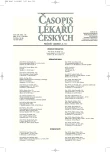Endoscopic and Conservative Treatment of Vesicoureteric Reflux
Endoskopická a konzervativní léčba vezikoureterálního refluxu
Východisko.
Cílem sdělení je zhodnotit výsledky endoskopické léčby vezikoureterálního refluxu (VUR) ve srovnání s konzervativní léčbou.
Metody a výsledky.
V letech 2003–2006 bylo zařazeno do prospektivní randomizované studie 44 dětí, které byly rozděleny do dvou skupin. Operováno bylo 22 dětí ve věku 1–40 měsíců ( 22,9 měs.). Dx/Ha, (Deflux®) byl instilován pacientům s VUR 3.–5. stupně. Konzervativně antibiotickou chemoprofylaxí bylo léčeno 22 pacientů ve věku 1–32 měsíců (průměrný věk 13,5 měs.). V rámci kontrolního vyšetření provádíme videourodynamické vyšetření k posouzení VUR a funkce močového měchýře a ultrazvukové vyšetření (vyloučení obstrukce operovaného močovodu). Hodnoceny byly výsledky endoskopické operační léčby 22 dětí, které byly sledovány 11–24 měsíců. Ve 12 případech (54,5 %) byl VUR vyléčen, u 5 dětí zlepšen na VUR 1.–2. stupně (22,7 %). Léčba byla bez komplikací, pouze v jednom případě byl po atace pyelonefritidy diagnostikován obstrukční megaureter. V konzervativní skupině bylo v uvedeném intervalu hodnoceno 22 dětí. V 5 případech (22,7 %) byl VUR vyléčen, u 4 dětí zlepšen na VUR 1.–2. stupně (18,2 %).
Závěry.
Endoskopická mininvazivní instilace dextranomeru je bezpečnou a efektivní alternativu léčby vezikoureterálního refluxu ve všech věkových skupinách s dobrým léčebným efektem a minimem nežádoucích účinků.
Klíčová slova:
Vezikoureterální reflux, endoskopická transuretrální instalace, antibakteriální chemoprofylaxe, Deflux®.
Authors:
Z. Dítě 1,2; R. Kočvara 1,2; J. Dvořáček 1,2; Jakub Langer 3
; J. Sedláček 1
Authors‘ workplace:
Urologická klinika 1. LF UK a VFN, Praha
1; Subkatedra dětské urologie a Katedra urologie IPVZ, Praha
2; Klinika dětského a dorostového lékařství, Praha
3
Published in:
Čas. Lék. čes. 2007; 146: 817-821
Category:
Original Article
Overview
Background.
The aim of study is to evaluate the results of endoscopic treatment of vesicoureteric reflux (VUR) comparing with conservative mode.
Methods and Results.
In the years 2003–2006 there were forty for children in prospective randomised study enrolled and divided into two groups. Twenty two children 1–40 months old ( 22,9 months) were operated. Dx/Ha (Deflux®) was instilled for VUR grade 3–5. The results of treatment were compared with outcome of twenty two conservatively treated randomly assigned children aged 1–32 months (mean age 13.5 months) Postoperative videourodynamic study was used to evaluate for the presence of VUR and function of the bladder and ultrasound investigation was performed too (exclusion of obstructive megaureter in operated group). There were 22 children controled after instillation. The children were followed 11–24 months. VUR was cured in 12 cases (54.5 %) and improved (grade 1–2) in 5 children (66,7 %). All children absolved treatment without any complications, excluding one case with obstructive megaureter after pyelonephritis diagnosed. There were 22 children evaluated in conservative group. Five children were cured (22.7 %) and VUR was improved (grade 1–2) in four (18.2 %).
Conclusions.
Endoscopic miniinvasive instillation of dextranomer is safe and effective treatment of VUR in all age groups with good therapeutical outcome and minimum of adverse effects.
Key words:
Vesicoureteral reflux, endoscopic transurethral instillation, antibacterial chemoprofylaxis, Deflux®.
Labels
Addictology Allergology and clinical immunology Angiology Audiology Clinical biochemistry Dermatology & STDs Paediatric gastroenterology Paediatric surgery Paediatric cardiology Paediatric neurology Paediatric ENT Paediatric psychiatry Paediatric rheumatology Diabetology Pharmacy Vascular surgery Pain management Dental HygienistArticle was published in
Journal of Czech Physicians

- Advances in the Treatment of Myasthenia Gravis on the Horizon
- Possibilities of Using Metamizole in the Treatment of Acute Primary Headaches
- Metamizole at a Glance and in Practice – Effective Non-Opioid Analgesic for All Ages
- Metamizole vs. Tramadol in Postoperative Analgesia
- Spasmolytic Effect of Metamizole
-
All articles in this issue
- New Aspects in Prostate Cancer Therapy
- Radical Cystectomy in the Treatment for Bladder Carcinoma: Results of 125 Operated Patients
- Cystectomy in the Treatment of Bladder Cancer
- Laparoscopic Radical Nephrectomy – The Cohort of 150 Patients
- Carcinoma of the Penis
- Controversial Opinions in the Prostate Cancer Treatment
- Comparison of the Efficacy of ESWL and Ureteroscopy in the Treatment of Lower Ureteric Stone
- Long-term Results of Uretroplastic Operations Using Buccal Mucosa in Different Modifications
- Detection of Prostate Cancer by Ultrasonographically-guided Transrectal Prostate Biopsies at the Department of Urology of the First Faculty of Medicine, Charles University and General Teaching Hospital in Prague, Analysis of 1464 Cases
- Evaluation of the Tumor Extension Before Planned Radical Prostatectomy: A Prospective Study
- Painful Bladder Syndrome in Interstitial cystitis: Relation Between Symptoms, Endoscopy and Biopsia Results and the Treatment Effects
- Progress of Laparoscopic Surgery in Adults at the Department of Urology of the First Faculty of Medicine and General Teaching Hospital
- Analyse of Results of Percutaneous Nephrolithotomies
- Conservative Treatment of the Traumatic Neurogenic Bladder Dysfunction
- Endoscopic and Conservative Treatment of Vesicoureteric Reflux
- Microsurgical Subinguinal Varicocelectomy in Children and Adolescents
- Journal of Czech Physicians
- Journal archive
- Current issue
- About the journal
Most read in this issue
- Painful Bladder Syndrome in Interstitial cystitis: Relation Between Symptoms, Endoscopy and Biopsia Results and the Treatment Effects
- Microsurgical Subinguinal Varicocelectomy in Children and Adolescents
- Long-term Results of Uretroplastic Operations Using Buccal Mucosa in Different Modifications
- Radical Cystectomy in the Treatment for Bladder Carcinoma: Results of 125 Operated Patients
